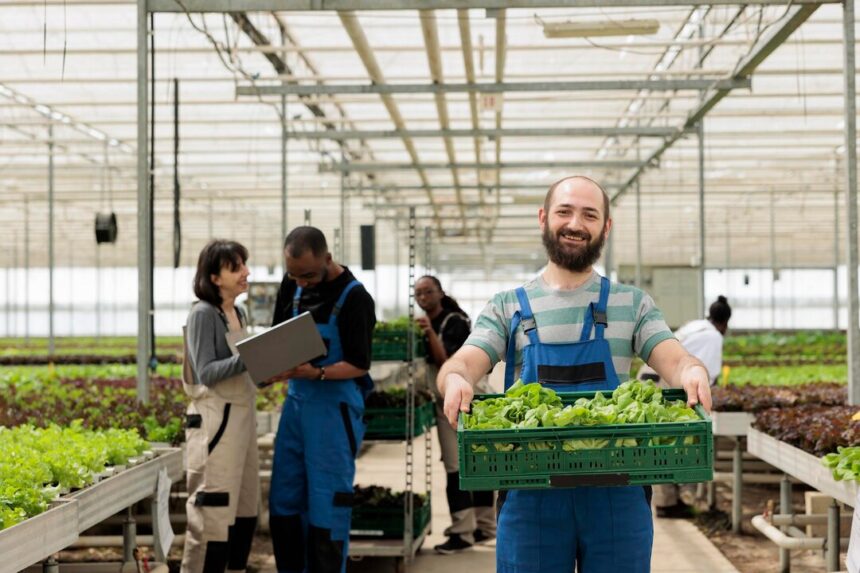Running a profitable vegetable farm in South Africa involves careful planning, strategic management, and a thorough understanding of the agricultural market. This article covers the essential elements such as revenue generation, cost management, risk mitigation, strategic planning, efficiency, productivity, market dynamics, financial management, growth strategies, investment, funding, and strategic planning necessary to ensure the success of a vegetable farming venture.
Revenue
Revenue in vegetable farming primarily comes from the sale of fresh produce to various markets. To maximize revenue:
- Diverse Crop Production: Grow a variety of vegetables to meet market demand throughout the year.
- Value Addition: Offer value-added products such as pre-washed, pre-cut vegetables, and organic produce.
- Direct Sales: Engage in direct sales to consumers through farmers’ markets, farm stalls, and community-supported agriculture (CSA) programs.
Costs
Effective cost management is crucial for maintaining profitability in vegetable farming. The costs include both fixed and variable expenses.
- Fixed Costs: These include land acquisition, infrastructure development (such as greenhouses and irrigation systems), and machinery.
- Variable Costs: These cover seeds, fertilizers, pesticides, labor, utilities, and transportation.
Cost Management Tips:
- Bulk Purchasing: Buy seeds, fertilizers, and other inputs in bulk to take advantage of discounts.
- Efficient Irrigation: Use water-saving irrigation methods like drip irrigation to reduce water costs.
- Labor Management: Optimize labor use through efficient scheduling and task management.
Risks
Vegetable farming involves several risks, including weather extremes, pest infestations, and market fluctuations. Mitigate these risks by:
- Crop Diversification: Plant a variety of crops to reduce the impact of a single crop failure.
- Insurance: Invest in agricultural insurance to cover potential losses due to adverse weather conditions or other unforeseen events.
- Integrated Pest Management (IPM): Implement IPM practices to manage pest populations sustainably and reduce crop damage.
Strategy
A well-defined strategy is essential for long-term success in vegetable farming. Key components include:
- Market Research: Continuously monitor market trends to align production with consumer preferences and demand.
- Sustainable Practices: Adopt sustainable farming practices to ensure long-term soil health and productivity.
- Quality Assurance: Maintain high standards of quality to build a strong reputation and customer loyalty.
Efficiency
Operational efficiency can significantly reduce costs and increase productivity. Enhance efficiency by:
- Modern Equipment: Invest in modern farming equipment to improve planting, irrigation, and harvesting efficiency.
- Labor Training: Train workers in best farming practices to ensure high productivity and minimal waste.
- Automation: Use automation technology for tasks like irrigation, fertilization, and pest control.
Productivity
High productivity is key to a profitable vegetable farm. Focus on:
- Soil Health: Regularly test and amend soil to ensure optimal fertility and crop yields.
- Crop Rotation: Implement crop rotation to maintain soil health and reduce pest and disease pressure.
- Efficient Planting: Use high-quality seeds and seedlings and employ proper planting techniques to maximize yields.
Market
Understanding market dynamics is critical for the profitability of your vegetable farm.
- Market Analysis: Conduct regular market analysis to understand demand, price trends, and consumer preferences.
- Branding: Develop a strong brand identity to differentiate your produce in the market.
- Export Opportunities: Explore export opportunities to access higher-paying international markets.
Financial Management
Effective financial management ensures the sustainability and growth of your vegetable farm.
- Budgeting: Create and adhere to a detailed budget to manage expenses and revenues.
- Record Keeping: Maintain accurate records of all transactions, production data, and financial statements.
- Cost-Benefit Analysis: Regularly perform cost-benefit analyses to evaluate the profitability of various practices and investments.
Growth
To ensure long-term growth, focus on expanding operations and diversifying income streams.
- Increase Acreage: Gradually increase the size of your farm to boost production.
- New Markets: Explore new markets for your produce, including niche markets for organic or heirloom vegetables.
- Allied Ventures: Consider allied ventures like agritourism, processing, or direct-to-consumer sales.
Investment
Investment in technology, infrastructure, and human resources is essential for growth and efficiency.
- Greenhouses: Invest in greenhouses to extend the growing season and protect crops from adverse weather.
- Cold Storage: Develop cold storage facilities to preserve produce quality and extend shelf life.
- Training: Invest in continuous training for your workforce to improve productivity and efficiency.
Funding
Access to adequate funding is crucial for the success of your vegetable farm.
- Government Grants: Explore government grants and subsidies available for vegetable farmers.
- Bank Loans: Secure bank loans for large investments in infrastructure and equipment.
- Private Investors: Attract private investors by showcasing the farm’s profitability and growth potential.
Strategic Planning
Strategic planning involves setting long-term goals and devising plans to achieve them.
- Vision and Mission: Define a clear vision and mission for your vegetable farm.
- SWOT Analysis: Conduct SWOT analysis to understand strengths, weaknesses, opportunities, and threats.
- Action Plan: Develop a detailed action plan with timelines and milestones to achieve your strategic goals.
By focusing on these aspects, vegetable farmers in South Africa can navigate the complexities of the farming business and achieve sustained profitability. Effective management, strategic planning, and continuous improvement are key to running a successful vegetable farming operation.
Join 'Farmers Mag' WhatsApp Channel
Get the latest Farming news and tips delivered straight to your WhatsApp
CLICK HERE TO JOIN






